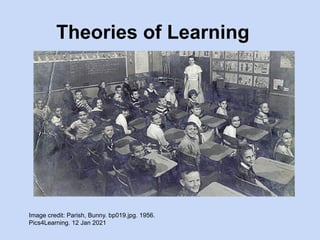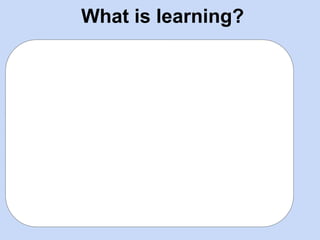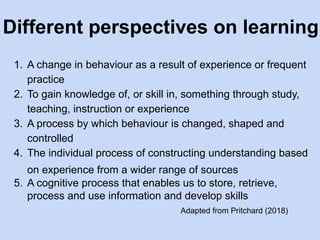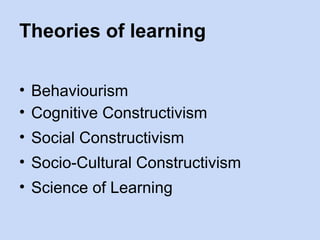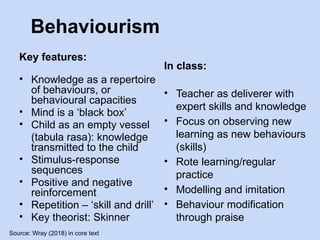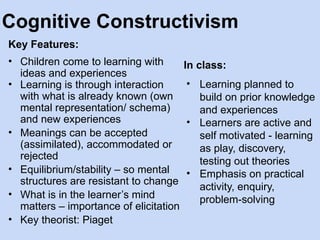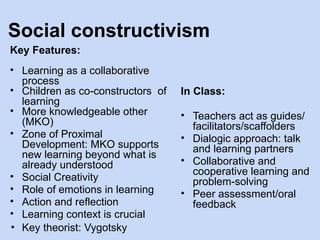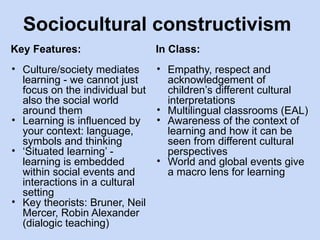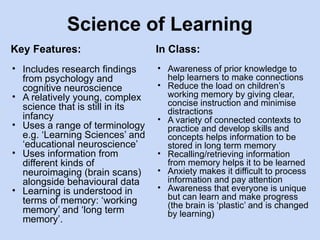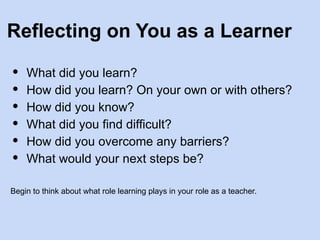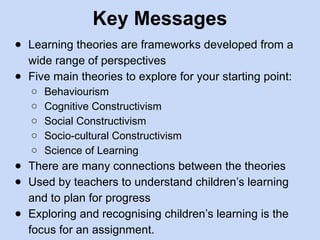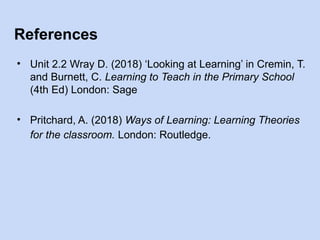Learning Theories Power point presentation
- 1. Theories of Learning Image credit: Parish, Bunny. bp019.jpg. 1956. Pics4Learning. 12 Jan 2021
- 2. Intended Learning Outcomes ŌĆó To consider implications for teaching and learning ŌĆó To introduce and pose questions about major theories of learning ŌĆó To recognise learning theories in action
- 4. Different perspectives on learning 1. A change in behaviour as a result of experience or frequent practice 2. To gain knowledge of, or skill in, something through study, teaching, instruction or experience 3. A process by which behaviour is changed, shaped and controlled 4. The individual process of constructing understanding based on experience from a wider range of sources 5. A cognitive process that enables us to store, retrieve, process and use information and develop skills Adapted from Pritchard (2018)
- 5. How do we understand learning? ŌĆśLearning is a natural process. Yet, understanding how we learn is not so straightforward.ŌĆÖ (Wray, 2018, p66) ŌĆó Theories of learning have developed from a range of perspectives: educational, social, cultural, psychological, neurological ŌĆó Their purpose is to help us understand how children learn and therefore to help inform planning and teaching.
- 6. Theories of learning ŌĆó Behaviourism ŌĆó Cognitive Constructivism ŌĆó Social Constructivism ŌĆó Socio-Cultural Constructivism ŌĆó Science of Learning
- 7. Behaviourism Key features: ŌĆó Knowledge as a repertoire of behaviours, or behavioural capacities ŌĆó Mind is a ŌĆśblack boxŌĆÖ ŌĆó Child as an empty vessel (tabula rasa): knowledge transmitted to the child ŌĆó Stimulus-response sequences ŌĆó Positive and negative reinforcement ŌĆó Repetition ŌĆō ŌĆśskill and drillŌĆÖ ŌĆó Key theorist: Skinner Source: Wray (2018) in core text In class: ŌĆó Teacher as deliverer with expert skills and knowledge ŌĆó Focus on observing new learning as new behaviours (skills) ŌĆó Rote learning/regular practice ŌĆó Modelling and imitation ŌĆó Behaviour modification through praise
- 8. Cognitive Constructivism Key Features: ŌĆó Children come to learning with ideas and experiences ŌĆó Learning is through interaction with what is already known (own mental representation/ schema) and new experiences ŌĆó Meanings can be accepted (assimilated), accommodated or rejected ŌĆó Equilibrium/stability ŌĆō so mental structures are resistant to change ŌĆó What is in the learnerŌĆÖs mind matters ŌĆō importance of elicitation ŌĆó Key theorist: Piaget In class: ŌĆó Learning planned to build on prior knowledge and experiences ŌĆó Learners are active and self motivated - learning as play, discovery, testing out theories ŌĆó Emphasis on practical activity, enquiry, problem-solving
- 9. Social constructivism Key Features: ŌĆó Learning as a collaborative process ŌĆó Children as co-constructors of learning ŌĆó More knowledgeable other (MKO) ŌĆó Zone of Proximal Development: MKO supports new learning beyond what is already understood ŌĆó Social Creativity ŌĆó Role of emotions in learning ŌĆó Action and reflection ŌĆó Learning context is crucial ŌĆó Key theorist: Vygotsky In Class: ŌĆó Teachers act as guides/ facilitators/scaffolders ŌĆó Dialogic approach: talk and learning partners ŌĆó Collaborative and cooperative learning and problem-solving ŌĆó Peer assessment/oral feedback
- 10. Sociocultural constructivism Key Features: ŌĆó Culture/society mediates learning - we cannot just focus on the individual but also the social world around them ŌĆó Learning is influenced by your context: language, symbols and thinking ŌĆó ŌĆśSituated learningŌĆÖ - learning is embedded within social events and interactions in a cultural setting ŌĆó Key theorists: Bruner, Neil Mercer, Robin Alexander (dialogic teaching) In Class: ŌĆó Empathy, respect and acknowledgement of childrenŌĆÖs different cultural interpretations ŌĆó Multilingual classrooms (EAL) ŌĆó Awareness of the context of learning and how it can be seen from different cultural perspectives ŌĆó World and global events give a macro lens for learning
- 11. Science of Learning Key Features: ŌĆó Includes research findings from psychology and cognitive neuroscience ŌĆó A relatively young, complex science that is still in its infancy ŌĆó Uses a range of terminology e.g. ŌĆśLearning SciencesŌĆÖ and ŌĆśeducational neuroscienceŌĆÖ ŌĆó Uses information from different kinds of neuroimaging (brain scans) alongside behavioural data ŌĆó Learning is understood in terms of memory: ŌĆśworking memoryŌĆÖ and ŌĆślong term memoryŌĆÖ. In Class: ŌĆó Awareness of prior knowledge to help learners to make connections ŌĆó Reduce the load on childrenŌĆÖs working memory by giving clear, concise instruction and minimise distractions ŌĆó A variety of connected contexts to practice and develop skills and concepts helps information to be stored in long term memory ŌĆó Recalling/retrieving information from memory helps it to be learned ŌĆó Anxiety makes it difficult to process information and pay attention ŌĆó Awareness that everyone is unique but can learn and make progress (the brain is ŌĆśplasticŌĆÖ and is changed by learning)
- 12. Reflecting on You as a Learner ŌĆó What did you learn? ŌĆó How did you learn? On your own or with others? ŌĆó How did you know? ŌĆó What did you find difficult? ŌĆó How did you overcome any barriers? ŌĆó What would your next steps be? Begin to think about what role learning plays in your role as a teacher.
- 13. Key Messages ŌŚÅ Learning theories are frameworks developed from a wide range of perspectives ŌŚÅ Five main theories to explore for your starting point: ŌŚŗ Behaviourism ŌŚŗ Cognitive Constructivism ŌŚŗ Social Constructivism ŌŚŗ Socio-cultural Constructivism ŌŚŗ Science of Learning ŌŚÅ There are many connections between the theories ŌŚÅ Used by teachers to understand childrenŌĆÖs learning and to plan for progress ŌŚÅ Exploring and recognising childrenŌĆÖs learning is the focus for an assignment.
- 14. References ŌĆó Unit 2.2 Wray D. (2018) ŌĆśLooking at LearningŌĆÖ in Cremin, T. and Burnett, C. Learning to Teach in the Primary School (4th Ed) London: Sage ŌĆó Pritchard, A. (2018) Ways of Learning: Learning Theories for the classroom. London: Routledge.
Editor's Notes
- #1: Image credit: Parish, Bunny.╠²bp019.jpg. 1956. Pics4Learning. 12 Jan 2021 free use for teachers and students for educational purposes.
- #3: So, we think learning, and understanding/recognising it is important, butŌĆ”. What is it? Do we all think the same? Is there a single definition? Reflect and add any thoughts to the slide. Tutor to summarise responses - could ask trainee teachers to show their agreement with a statement by ŌĆśraising their handŌĆÖ.
- #4: Tutor to present different perspectives of learning: Emphasis on distinction between behaviour, knowledge, skills and understanding, and individual experience vs shared experience or instruction. Ask BSTs to reflect: Should these be considered differently? What is challenging their thinking? Question whether we are assuming that learning is attributed to individual pupils. Could these ideas refer to the learning of groups - in school or in wider society?
- #5: Beginning of Wray 2018 chapter "Learning is a natural process. Yet, understanding how we learn is not so straightforward." Often in assignments, students view the theories as ways we learn and teaching in different situations, rather than being possible explanations as how the learning is occurring. We need to emphasise that the theories are meant to help us understand the learning taking place. Wray goes on to ask "... does it matter how we define it? Will that actually make a difference to our teaching?" What do we think?
- #6: Remember when using these ideas in written reflection on your experiences in schools, they are not about criticising other teachers or teaching practicesŌĆō focus on the children and their learning and the implications for your own practice. Different lenses to understand learning: presenting 5 key theories; frameworks that have been developed over a number of years by key theorists to help explain and recognise learning - theories, not fact.
- #7: 15 min task: Allocate one learning theory to each of the 5 ŌĆśroomsŌĆÖ you set up. Ask the students/trainee teachers to work together to plan a 3 minute interview but only one needs to take on the role of the interviewer. They can return to the main room at any time to ask any questions they may have. 15 min sharing: Allow 3 minutes per performance. Reassure trainees//students that this is not a test that they have remembered/learnt everything about the learning theory but a way to start engaging with the different ideas.
- #8: Copies of links Behaviourism: https://youtu.be/bq5g8u0qx5c (3 mins) Cognitive constructivism: https://www.youtube.com/watch?v=lvxraaGYWuc (4 mins) Social constructivism: https://www.youtube.com/watch?v=NcznYMK6r_8 (4 mins) Sociocultural constructivism: Robin AlexanderŌĆÖs Dialogic Teaching (6 mins focus on first 4 mins) Science of Learning: https://www.youtube.com/watch?v=ilbf10mHcv4 (6 mins)
- #9: For expert group or tutor reference
- #10: For expert group or tutor reference
- #11: For expert group or tutor reference
- #12: For expert group or tutor reference
- #13: For expert group or tutor reference
- #14: Prompt trainee teachers/students to consider their own new learning from a task on the course or precourse task. In the chat box ask, ŌĆśdoes anyone have any examples of learning that could be explained from a behaviourist standpoint?ŌĆÖ For example, rote learning of times tables (ask for each of the learning theories): Behaviourism, cognitive constructivism (e.g. taking an online course in photography to build on what I already know), social constructivism (e.g. learning a song as part of a choir), sociocultural constructivism (e.g. learning Spanish in Peru), science of learning (e.g. reading about a new topic, explaining it and teaching it to someone else or learning in a calm environment where information was broken down into chunks) Precourse Task: Begin to explore and investigate learning. A key thread of your PGCE year will be considering how learning and progress can be maximised so that as a teacher you inspire and enable children to reach their full potential. To start this process, it would be helpful for you to begin to consider yourself as a learner. Before you start your PGCE, take time to learn a new skill or new game. Consider what prior learning or experience helped you to be successful. Notice what you find hard about the task and how you overcame that difficulty. How challenging did you find the task? How did you improve overtime? How did you feel at different points? Did you learn on your own or with friends or family? There is no need to write up this task; but do come prepared to share your experiences in your Professional Studies seminars.
- #15: To save seeing repeated misunderstandings in assignments is it advisable that we all make sure they know that Vygotsky died in the 1930s, that Piaget (died 1980 so was writing long after Vygotsky) is more than age and stage (the most critiqued aspect of his theory) and did not say that social aspects weren't important; Bruner is the go-to theorist for scaffolding, too.
